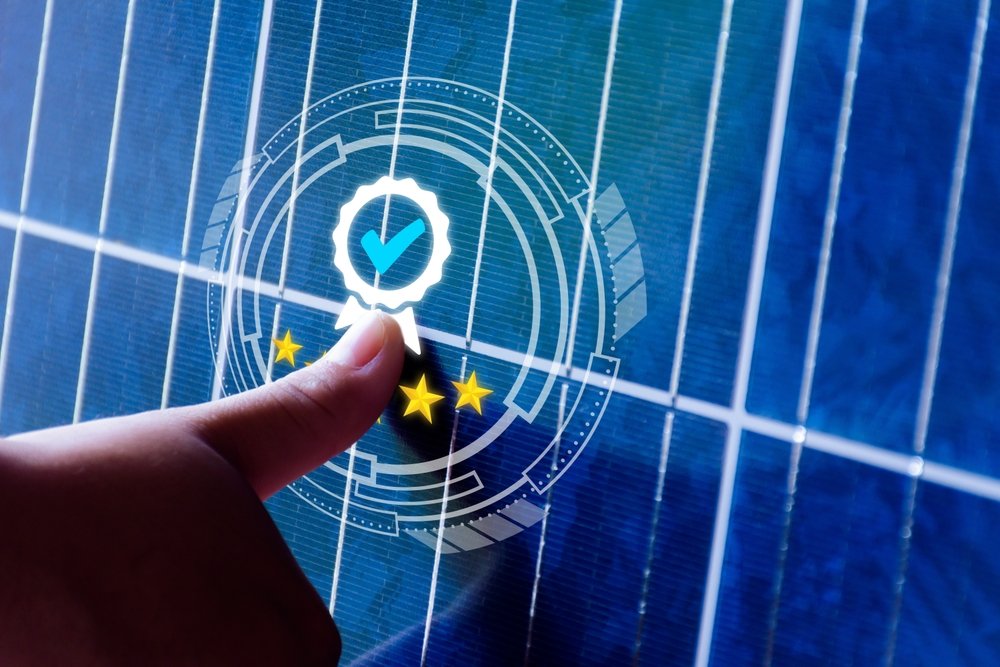Knowing how to choose the right solar installer assists in handling your finances by considering the certifications, licenses, track record, experience, after-sales credibility, workmanship warranty, user reviews, and testimonials since installing solar panels is an important decision.
This renewable energy source helps save money on your electricity bills to recover your initial investment in the solar system and reduce the carbon footprint to minimize greenhouse gas emissions. Also, you can enhance the value of your property in the real estate market and claim tax credits, which is an added advantage. For example, the federal solar tax credit, available for users from 2022 to 2032, makes it easier to reduce 30% installation costs.
However, the crucial part of the entire process involves selecting a certified solar installer. To understand what makes a solar company qualified, you need to list several essential questions to ask your solar installer. As a result, you can understand the transparency involved in the solar installation process and schedule, as well as compare different quotes on solar panel equipment by checking the system’s longevity and performance.
What Makes a Good Solar Company?
Selecting the best solar company can be a challenging task unless you gain knowledge about the signs of a profitable and stable company to make informed decisions, which depends upon these key factors:
- Certification: A certification in the solar industry is a proof of excellence given to professionals or companies, guaranteeing their practical skills and knowledge are necessary to achieve success in their roles. This helps the company to contribute the best to the clients by making their lives more comfortable and creating awareness about eco-friendly nature to tackle the challenges in the real world.
- Customer Satisfaction: Positive reviews from previous customers are a strong indication of the company’s performance. It can add value to the service provided by the company and its excellent service provided to users by resolving any issues promptly.
- Good Solar Equipment: Using top-quality solar equipment is mandatory to determine the efficiency and longevity of your solar panel system. Reputed solar companies use premium-quality solar panels, solar inverters, solar batteries, and other components that have undergone rigorous testing to guarantee their performance and durability. In simpler terms, achieving a good rating is risk-free and a top choice for your solar energy systems under varying situations.
- Well-rounded service: A well-rounded service not only requires proper installation of solar panels but also requires evaluating the ongoing maintenance, ensuring correct monitoring and support. It is a fact that companies that provide the best services can help to increase the advantages of your investment in solar energy by ensuring that the system operates safely during its lifespan.
Ways to Choose the Right Solar Installer For You
As a homeowner, while choosing the right solar installer for your needs you should consider important criteria such as certifications and licenses, credibility and expertise, reviews and responses, accountability, different equipment, workmanship warranty, installation schedule, and comparison of multiple quotes. The answer to this question is simple, as the important factors are discussed below in detail:
Certifications and Licenses

Here are the key industry-standard certifications from NABCEP (North American Board of Certified Energy Practitioners), International Renewable Energy Council (IREC), and International Association of Electrical Inspectors (IAEI) required for a solar installer:
1. NABCEP:
- PV Installer Certification: It certifies a technician is skilled enough to perform the installation and maintenance process of the solar PV systems.
- PV Technical Sales Certification: It mainly focuses on business development and manufacturing, which highlights the ability to communicate and plan for solar energy solutions.
- Solar Heating Installer Certification: It recognizes the knowledge of the individuals to install solar heating systems.
2. IREC:
- Accredited PV Installation Professional Training Program: It is a program to train individuals in the basic skills of PV system installation and maintenance that consists of online courses and live equipment training courses (known as hands-on lab component).
3. IAEI:
Solar PV System Inspector Certification: This certification program is for electrical inspectors to accurately inspect, test, and approve solar PV systems.
Most importantly, a solar installer needs to be licensed, bonded, and insured to justify these reasons:
- A properly licensed solar installer helps them to fulfill the minimum set of requirements, and the right to perform the role in a specific location.
- Being bonded refers to the installer or company with a sure bond. This ensures to provide financial safety for customers if the installer performs any incomplete work, damages, theft, or undergoes other failures. You can find two types of bonds, namely Fidelity bond and Surety bond.
- Here, insured means to protect the customer as well as the installer from possible risks such as damages or risks during installation. This helps to handle issues without any financial pressure on customers.
These certifications and qualifications affect installation quality in terms of assured quality installations, safety of team and customer, and increasing customer confidence.
Credibility and Expertise
A credible and expert solar installer should have experience in installing solar panel equipment and have a proven track record of successful installation and a well-deserved reputation for top-quality work.
Typically, solar installers should have at least 3 years of working experience in the industry.
To check out the installer’s knowledge, you need to ask these basic questions, such as:
- How many years of working experience do you have?
- So far, how many solar systems have you installed successfully?
- Are you certified, licensed, bonded, and insured by NABCEP? Do you have any additional certifications?
- Can you show your business license number?
- If possible, can you provide the references of at least five satisfied customers, who have hired you for installation?
- How many years of your life have you worked with this utility company?
- Do you hire other individuals to assist with your work? If YES, then explain how you evaluate your subcontractors’ performance to achieve the best work.
Reviews and Testimonials
Online reviews, testimonials, and feedback from previous customers play an important role in choosing a solar installer as they provide additional information about the company’s reliability, work quality, and customer service.
Here’s how you should conduct this research:
- Overall Rating and Number of Reviews: The reputation and reliability of a company can be determined by the overall rating and number of reviews. A favorable rating with a lot of positive reviews indicates the consistent performance and satisfaction of customers.
- Content of Reviews: While evaluating the quality of a solar installer company, you should look for the rating and maximum number of reviews. Also, you need to search for negative reviews to identify possible issues.
- Source of Company Review: If you’re searching for genuine reviews, you should focus on websites that have good reputations and proven track records to validate the review. Another best method involves checking meaningful reviews on the solar company’s official website.
- Ask for References: It is advisable to ask your installers for references from past customers so that you can contact them and gain valuable insights to find out if the installation process was performed smoothly.
Personal recommendations from family, friends, or neighbors, who have installed solar power systems can prove to be very helpful since they play an important role in selecting an installer. You will gain more confidence by gathering direct feedback from your known sources rather than searching through online reviews.
You can gain suggestions from local sources by asking detailed questions and receiving immediate responses, which means that the installer might be familiar with the exact requirements and regulations of your locality.
Transparency
Transparency is an essential factor when choosing a solar installer to ensure straightforward communication so that you can build trust, and reduce hidden costs by asking for detailed quotes and cost breakdowns to make smart decisions about your solar installations.
These are the details the installer should be upfront about:
- Providing information to customers about your experience, certifications from NABCEP (North American Board of Certified Energy Practitioners), and references from previous customers.
- Explain the financial details such as material and labor costs, permitting and inspection costs, loans, leases, tax credits and incentives, rebate information, and other forms of solar incentives.
- Having information about the suggested system design, expected performance, and its capacity to meet your energy demands.
- Providing clear timelines for the process related to installation, by including any expected delays and the methods to handle them.
- Gaining knowledge about warranties for both equipment and installation as well as for maintenance.
- Knowing the information about permits and approvals required for installation and who will be responsible for it.
Solar Equipment
Homeowners should be mindful of quotes that do not specify the solar panel brand or include vague terms, as it can indicate the utilization of inferior quality modules or less reliable equipment.
Also, it is important to compare solar quotes to understand price variations and make effective decisions while considering factors such as product quality, installer track record, price range, financing options, and warranties. Furthermore, you can enhance your return on your investment by understanding the price variations and choosing the system size and design that best suits your needs with particular energy goals.
The choice of equipment can affect the solar system’s performance and longevity in the following ways:
- High-quality modules have superior energy conversion efficiency and generate huge electricity since they have better light absorption features to capture energy from the same amount of sunlight to improve the return on investment (ROI).
- The top-performing equipment can withstand harsh weather conditions, having a lower degradation rate by remaining efficient for longer periods.
- The system’s performance can be improved and reducing the chances of failures is completely possible by the choice of inverters, batteries, and other components that play an important role in the overall reliability of the solar system.
- By investing in highly reliable equipment, it is possible to reduce the system and operational costs throughout its lifespan.
Workmanship Warranty

A workmanship warranty is essential because it assures the highly skilled workers to take part in your project. In contrast to the product warranty that covers the equipment used, a workmanship warranty focuses on the top quality of work performed.
Workmanship warranties and manufacturer warranties complement each other as they cover different elements of a project in the following ways:
- Manufacturer warranties offer coverage of 10 to 30 years (based on the material quality) to compensate for any failures or defects of roofing materials due to early aging or manufacturing failures.
- A workmanship warranty typically guarantees the work completed by the contractor, which includes any installation defects.
Installation Schedule
Homeowners should ask about the installation schedule upfront for these main reasons:
- Plan the projects effectively by understanding the timeline to make required arrangements. It includes ensuring your presence during installation or dealing with other contractors.
- Easy to set reasonable expectations for both homeowners and installers.
- Makes it simpler for installers to allocate additional resources and team members during a clear schedule.
- Allows using of weather tracking tools to schedule installations during favorable weather conditions.
Delays can impact the project and homeowner’s satisfaction in the following ways:
- Delayed Penalties: Installers have a timeline to complete a project. If, in case, there are any delays beyond these timelines, installers might face a penalty, which could weaken their relationship with the homeowners.
- Additional Expenses: If the project is prolonged, it leads to additional labor costs or penalties for not satisfying the contractual targets.
- Dissatisfaction: There could be reduced satisfaction for homeowners if the project is delayed.
- Affects the Return on Investment: Since the delayed projects increase the cost, it can impact the return on investment, thereby making it challenging for consumers to invest funds.
- Disrupts regular schedule: Frequent delays can interfere with the routine schedule of homeowners, particularly for properties with complex designs.
Compare Different Quotes
It is important to compare solar quotes from multiple installers so that you can save costs up to 25% on your solar system. Once you receive multiple quotes, installers are ready to compete to join your project. All you need to do is reduce quotes as leverage to cut down the costs and find the perfect solar panel system at the most reasonable price.
Homeowners can calculate the solar price per watt (PPW) to compare quotes accurately through the below-explained straightforward formula which suggests dividing the system cost (in USD) by the system size (in watts):
- Solar PPW = Cost of System / Overall wattage of the system
These are the main financial red flags you need to consider, which is an indication that the deal might not satisfy your best interests:
- Ads specifying solar panels are completely free of cost.
- Promotions such as the special programs closing soon.
- Salespersons pretending to be the official employees of the utility company.
- Installers not being able to provide a copy of the official contract.
- Providing false information about state or federal incentives that you aren’t eligible to qualify for.
- Solar companies use wrong estimation methods to calculate the increase in price annually.
- Lack of information (such as not providing model numbers) in the quotes provided.
The cheapest quote might not offer the best value due to lower equipment quality, limited warranty periods, and non-professional installation practices.
Also, lower quotes can pose huge risks due to these reasons:
- Failure to fulfill the quality standards.
- Non-durability or inefficiency.
- Frequently prone to failures.
- Lack of warranty support.
- Failure of post-sales service.
- Improper paperwork results in frequent issues and financial losses.
Important Questions To Ask Your Solar Installer
There are several questions you should ask a solar installer while preferring a solar installation, out of which the main ones are listed below:
- How long have you been in this profession?
- Can you show your company’s certification?
- What are the rules in my locality?
- What are the different types of solar incentives available in my region?
- Who structures the system and plans the expected annual output?
- What are the types of equipment used for installation and was it manufactured legally?
- What are the financing options offered (leasing, power purchase agreements, loans, and other kinds of financial assistance) and how they vary from each other.
- Do I need to be at home during the entire installation process?
- Is it mandatory to replace a new roof before installing the solar panels?
- What is the estimated timeline for installation?
- Can I add more panels or devices to my existing solar system?
- How to calculate my lifetime savings through the solar system?
- Which inverter is best to use (central inverter, micro-inverter, or power optimizer) and why?
- What is the estimated cost of removing old solar panels and replacing them with new ones?
- How to sell extra energy back to the grid?
Ray is an avid reader and writer with over 25 years of experience serving various domestic and multinational private and public energy companies in the USA.

